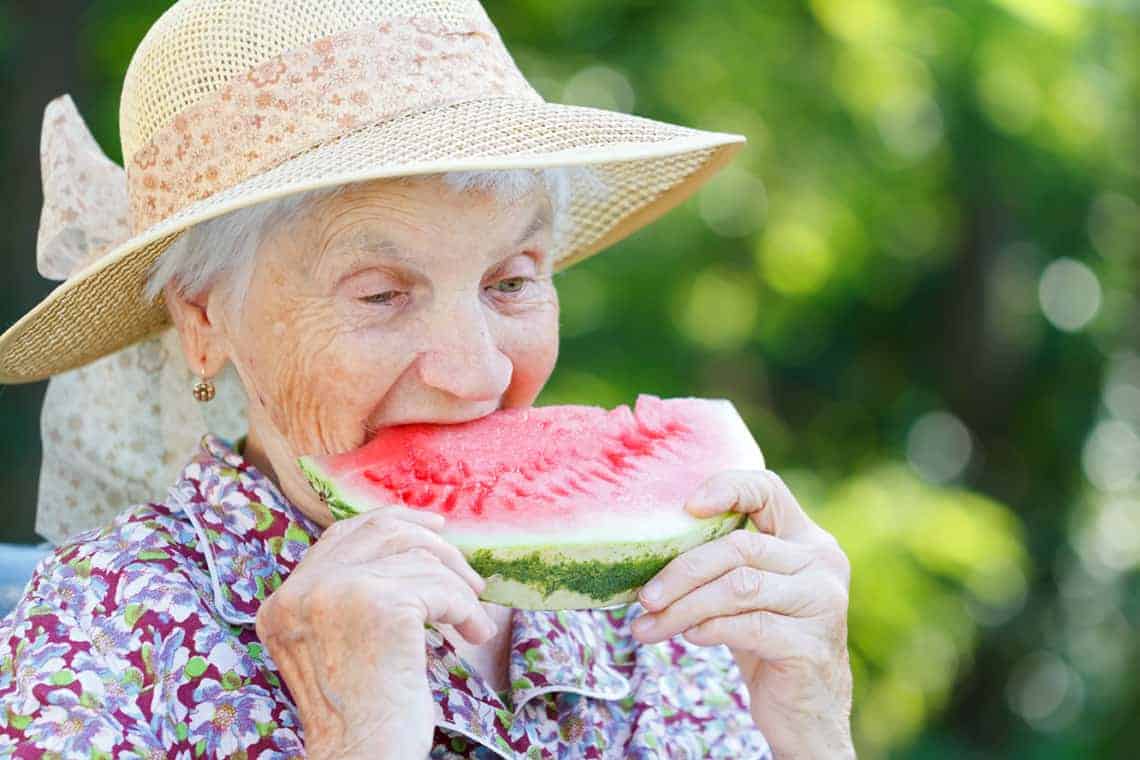
Tips for Helping a Person with Alzheimer’s Get Proper Nutrition
It can be difficult for people in the middle and late stages of Alzheimer’s to eat regular, nutritious meals. Too many food choices can be overwhelming. You may find that your loved one forgets to eat, or thinks they have already eaten.
Below, learn more about how you can help a person with Alzheimer’s or memory loss with elderly health issues around eating.
Nutrition Tips
When caring for someone with Alzheimer’s or dementia, you do not need to be concerned with a specific diet. Instead, focus on ensuring they eat a balanced, nutritious diet, just like anyone else.
Cover the Basics
- Be sure to provide a variety of foods throughout each week. A balanced diet includes vegetables, fruits, whole grains, and healthy sources of lean protein.
- For some people, remembering to stay hydrated can be a challenge. Give your loved one small cups of water throughout the day—they may not remember on their own. Water can also be consumed through food, including whole berries and smoothies.
- If weight loss or appetite loss become a concern, a doctor might recommend supplements between meals to help maintain a healthy weight.
What to Avoid
- While some fat is important to health—like unsaturated fats found in olives and nuts—others, like butter, shortening, and fatty meats can be harmful in excess.
- Refined sugars found in candy, ice cream, and many packaged foods. If you are looking to satisfy a sweet tooth, healthier options include fruit and dark chocolate.
- Many of us consume more than the recommended amount of sodium per day. Using herbs and spices to season meals can help make food taste good without so much salt.
The Eating Process
In addition to making sure your loved one eats a balanced diet, senior health care also involves recognizing that meal time can be stressful for people experiencing memory loss. These elderly health care tips may help create a more relaxing eating experience for both you and your loved one.
Increase Comfort
- Serve meals with as few distractions as possible. These distractions, like the television, can become overwhelming at meal times for people experiencing memory loss.
- How is the food’s temperature? Someone with Alzheimer’s or dementia may not be able to tell if a food is too hot to consume.
- To cut back on decision-making, it may help to serve one food at a time, rather than many foods on one plate.
- Try to be patient. It can take a long time for your loved one to finish eating.
- Making mealtimes as social as possible by eating in a group may encourage them to eat.
Consider Visual Challenges
- Keep the table setting, including plates, tablecloths, and napkins as simple as possible, without patterns.
- White bowls and plates make it easier for your loved one to distinguish food from the plate.
- A colorful plate can help, too! Seniors with memory loss may have difficulty eating if all food looks the same (ex: white potatoes, cauliflower and chicken breast).
Extra Tips to Help a Person with Alzheimer’s
In addition to what we’ve discussed above, people with Alzheimer’s will also benefit from prolonged independence. Also, understanding why your loved one isn’t eating enough can be helpful in encouraging a healthy, balanced diet.
Understand Possible Causes of Poor Appetite
- The person may have trouble recognizing foods, making them hesitant to eat.
- Eating may be painful due to ill-fitting dentures or stomach pain
- Dosage changes to medication can affect appetite. If your loved one’s appetite changes after a medication change, let their doctor know.
- Your loved one may need more exercise or physical activity, whether that is a walk around the block or up and down the hall.
Encourage Independence
- Prolong independence as much as possible during meal times, and be ready to step in for help as needed.
- Adapt dishes to make eating easier—for example, bowls and plates with ridges make it easier to contain food.
- Finger foods can make it easier for a person to serve themself.
Copeland Oaks Memory Care Facility
There may come a time when your loved one requires senior health care beyond a level you are able to provide. At Copeland Oaks, seniors experiencing memory loss benefit from attentive, expert care in a safe and secure environment.
Click here to learn more about memory care at Copeland Oaks.
